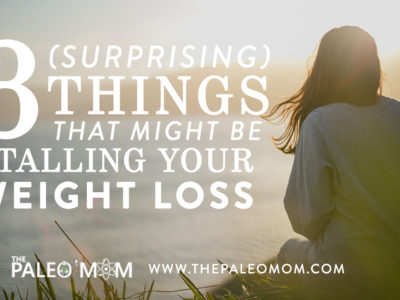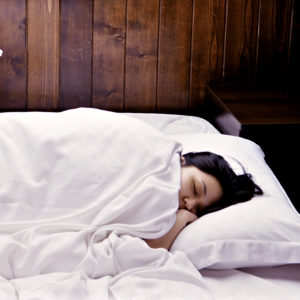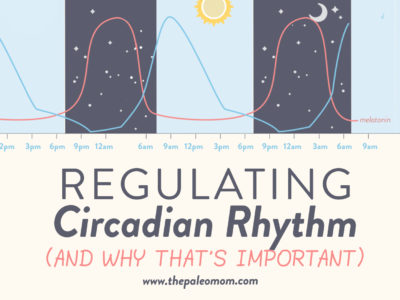There’s nothing more damaging to a weight loss effort than feeling like we’re doing everything right but still not seeing results. Believe me, I’ve been there: I lost over 100 pounds with a low-carb diet in my early-twenties, gained it all back plus 30+ pounds interest during a health crisis in my mid-twenties, and finally lost all that weight, this time keeping it off, starting in my mid-thirties. It was a rocky road, and I hit many plateaus along the way (and I’ve even encountered some since).
Table of Contents[Hide][Show]
Plateaus are a challenge that can play out in a variety of ways. Maybe we started off losing weight rapidly and then our progress stalled, or we are feeling better about our health overall (more energy, clearer skin, etc.) but haven’t seen the results on the scale yet. Though plateaus can often cause us to beat ourselves up (and maybe even feel like throwing in the towel!), the truth is that any number of underlying factors can cause a plateau. Plateaus can be a natural short-lived consequence of shifting hormones and metabolism as our bodies adapt to a different composition, resolving on their own with persistence. Plateaus can be the result of increasing muscle mass, so body composition is improving even though the scale isn’t budging. But, plateaus can also indicate that we’re dealing with an underlying issue we haven’t considered yet, like: sleep, high stress, undiagnosed autoimmune disease, adrenal fatigue, micronutrient deficiencies, overeating calorie-dense foods like nuts, or undereating calories (see: Tips and Tricks for Losing Weight). In this case, figuring out what the underlying issue is and addressing it is key to making any further progress. To help you narrow down what’s behind your plateau, here are three common, major factors that could be stalling your weight loss!
1. Sleep (not enough of it)
Okay, so, this may not be a huge surprise for anyone who has been following my blog for a while. But, what we do know is that medical research has shown that there is a stronger connection between obesity and lack of sleep than any specific factor related to diet. So, while one approach to weight loss could be to tighten up a Paleo diet protocol or adapt one of the extreme Paleo modifications touted as being weight loss magic bullets (news alert: they’re not), a healthy, safe, and effective first approach would be to simply sleep more and/or focus on improving sleep quality. The strong scientific connection between sleep deprivation and weight problems is the reason why the first question I always ask whenever someone is not seeing the weight loss results they are looking for is, “How’s your sleep?”
Sleeping less than 6 hours per night increases risk of obesity by 55% in adults (90% in children!). And even in people getting enough sleep overall, variability in bedtime during the week >2 hours, >1-2 hours variability in sleep duration, and sleeping out-of-sync with the sun all independently increase risk of obesity. In fact, following the night owl patterns of late-to-bed, late-to-rise doubles risk of obesity compared to early-to-bed, early-to-rise!
Save 80% Off the Foundations of Health
Expand your health knowledge on a wide range of topics relevant to you, from how to evaluate scientific studies, to therapeutic diet and lifestyle, to leaky gut and gut microbiome health, to sustainable weight loss, and much more!!!

One of the coolest scientific discoveries of the last few years has been the identification of the reason we actually need sleep. Sleeping is an absolutely necessary bodily function for multiple reasons, including memory consolidation, hormone regulation, and muscle toning and building. But, there is an even more fundamental reason that sleep is a commonality amongst almost all animals: sleep permits our brains the time to flush out waste products that have accumulated throughout the day (a totally normal part of cellular function) into the bloodstream. Once they are removed from our brains and sent into the bloodstream, the kidney and liver can do their jobs as filters and remove or recycle them. But when we don’t sleep properly, the waste products left over from our brain’s daily functions are not properly cleared away, and the waste acts as a toxin to disrupt brain function and increase inflammation. That negatively impacts every single system in our bodies, so the notion of losing weight is pretty much out of the question.
And it gets worse. When we don’t get enough sleep, our hunger hormones and metabolisms are affected, causing an increase in appetite. As little as one night of 3 or 4 hours sleep causes insulin resistance, dysregulated cortisol, and increased leptin–all hormonal situations that lead to weight gain. If this kind of sleep becomes a habit (specifically, 5 days in a row with four hours of sleep or less), then a person is said to be in sleep deprivation. Studies have shown that someone suffering from sleep deprivation eats substantially more than they normally would (up to 20% more!!). Plus, not getting enough sleep also increases the body’s stress response, which affects the body’s metabolic rate (to actually make it lower, because our bodies want to conserve energy). For more information on the way lack of sleep affects our hormones check out The Link Between Sleep and Your Weight.
As a society, we’re pretty awful at prioritizing sleep! In fact, many of us put it last on our To Do lists, prioritizing going out at night, studying, work, Facebook, our favorite HBO shows and almost everything else above actually getting in bed and sleeping. The reality is, if we all got the recommended 7-9 hours of sleep for adults every night, then we would be much better at performing all of the tasks we currently prioritize over sleep—and we’d be much healthier too (see: Sleep Requirements and Debt: How do you know how much sleep you need?).  I strongly believe that the greatest negative impact on our health is coming from not prioritizing sleep in our lives and just getting our butts in bed at a reasonable hour every night. That’s why I’ve worked so hard to develop a comprehensive program to help you fix your sleep. Go to Bed: 14 Easy Steps to Healthier Sleep has just been relaunched and now includes even more amazing tips and tricks to give yourself the best sleep you’ve ever had. The program includes a 350+ page guidebook to set you on the right path to sleeping better and improving your body’s overall health. The 14-step program will have improve your sleep in just two weeks and the book even includes comprehensive coverage of troubleshooting strategies and biohacks to solve common sleep problems. It is truly the most comprehensive sleep guide out there!
I strongly believe that the greatest negative impact on our health is coming from not prioritizing sleep in our lives and just getting our butts in bed at a reasonable hour every night. That’s why I’ve worked so hard to develop a comprehensive program to help you fix your sleep. Go to Bed: 14 Easy Steps to Healthier Sleep has just been relaunched and now includes even more amazing tips and tricks to give yourself the best sleep you’ve ever had. The program includes a 350+ page guidebook to set you on the right path to sleeping better and improving your body’s overall health. The 14-step program will have improve your sleep in just two weeks and the book even includes comprehensive coverage of troubleshooting strategies and biohacks to solve common sleep problems. It is truly the most comprehensive sleep guide out there!
The bottom line is: our bodies need sleep in order to function properly. Obesity is just one of the many health problems that to which chronic lack of sleep has been linked. Poor sleeping habits actually increase the chance of death from all causes (see Sleep and Disease Risk: Scarier than Zombies!), so there are many reasons to make sleep a priority. If you find yourself asking why you aren’t seeing results even if you are doing everything right in the diet department, it may be time to take a closer look at your sleeping habits!
2. Stress (too much of it)
 Sleep may be the biggest factor hindering weight loss, but certainly it’s not the only one. Lack of sleep increases our body’s’ stress response, which slows our normal metabolic rate. Imagine how strong the negative effects would be if the stress caused by sleep deprivation was only multiplied by the added stress from our day-to-day lives! This stress problem is called chronic stress, because it is a low-grade stress response that lasts for days or months (or years!). The negative health impacts are well-studied and are most definitely related to weight loss results.
Sleep may be the biggest factor hindering weight loss, but certainly it’s not the only one. Lack of sleep increases our body’s’ stress response, which slows our normal metabolic rate. Imagine how strong the negative effects would be if the stress caused by sleep deprivation was only multiplied by the added stress from our day-to-day lives! This stress problem is called chronic stress, because it is a low-grade stress response that lasts for days or months (or years!). The negative health impacts are well-studied and are most definitely related to weight loss results.
So what exactly does chronic stress do to our bodies? A better question might be “what doesn’t chronic stress do to our bodies?” It can have a severe impact on our immune system, the amount of inflammation in our bodies, hormone health, our sleep patterns, and even the food we choose to eat (see How Stress Undermines Health and How Chronic Stress Leads to Hormone Imbalance). Chronic stress is different from the acute stress response we experience that causes our “fight or flight” response to kick in. Unlike acute stress, chronic stress doesn’t have a clear relief. The tiger that was chasing you, causing your stress response, never stops—because the tiger is work, or school, or your family life.
As a mother, author, and small business owner, I can tell you from personal experience that not having a handle on our stress levels can really take a toll on our bodies (see: My Personal Battles With Stress). I can also understand how difficult regulating stress levels can be. The first step to managing stress is actually regulating our cortisol levels. Ideal cortisol levels are highest in the morning and decrease slowly throughout the day; however, when our bodies respond to stress our cortisol levels become elevated, and the levels can spike late in the day. These spikes can disrupt our sleep cycle, and I’ve already covered all of the ways that can damage your health!
We can take a few easy steps to ensure that our cortisol levels follow the appropriate pattern (see Managing Stress). These include giving up (or severely limiting) your caffeine intake, eating a strict Paleo diet, getting outside for your daily dose of vitamin D, getting more low-strain exercise (like yoga, swimming, or walking), playing, enjoying the health benefits of connection, and getting enough sleep.
The second piece of reducing stress is much more individual. It involves finding the best ways to manage the people, places, obligations, or things that cause us stress. Small things like asking someone else in the house to help out with some chores, meditating for a few extra minutes a day, or finding time to enjoy our favorite activities can make a world of difference. Remember: our health is important, and the only way we’ll be able to take care of others is if we’re healthy ourselves.
So, the evidence is clear: chronic stress is a significant contributor to weight loss plateaus, and we might be able to break through a plateau by stressing less. In the end, it’s a win-win situation!
3. Tracking Progress in the Wrong Way
The idea that when you start Paleo you should “throw out your scale” is pretty pervasive in this community. On one hand, I totally get it: the idea is that we should base our progress not on a number, but rather how we feel and look, the fit of our clothes, and our progress in the gym. That doesn’t sound too bad! But in truth, I’m a bit skeptical of this approach. For years, I have weighed myself daily in order to get a better understanding of the way my weight fluctuates throughout the day and to have an early indication of a bad week causing a slip in my weight. I have found the scale to be a helpful tool to help gauge my progress and to let me know when less sleep, stress, or anything else are causing me to slip. However, if someone is prone to disordered eating, chronic dieting, or bad self-talk (I know I’ve been guilty of all of these and have had to work through them!), using the scale as a metric may not be the best option. However, there are many other options for keeping track of our progress!
![]() One of my best recommendations is to start journaling! In the new redesign of Go to Bed: 14 Easy Steps to Healthier Sleep, I’ve included surveys and journal pages to help evaluate our progress (see Go To Bed Pre-challenge Sleep Survey) because it’s such an effective way of identifying issues and keeping ourselves intentional in our choices. Journaling has long been used in therapy as a stress reliever. In the case of sleep and weight loss, journaling can help to form the healthy habits that are crucial for seeing the results we want. It can actually take anywhere between 3 weeks and 8 months to form a long lasting habit (the average is 66 days, not the 21 that is urban myth). By keeping a health journal for everything from our sleep to what we eat, we can easily hold ourselves accountable and track our progress in more than just numbers. When we have something concrete like a journal to look at and can see how we are progressing, it can be much easier to feel great about all of the progress we made! For more information about the benefits of journaling see: The Power of Journaling for Positive Self-Change: Self-Monitoring Makes All the Difference. Sometimes the path to being your healthiest self is slow going, but keeping a positive mindset and having concrete reminders of that movement—whether in weight, sleep quality or performance—can be crucial.
One of my best recommendations is to start journaling! In the new redesign of Go to Bed: 14 Easy Steps to Healthier Sleep, I’ve included surveys and journal pages to help evaluate our progress (see Go To Bed Pre-challenge Sleep Survey) because it’s such an effective way of identifying issues and keeping ourselves intentional in our choices. Journaling has long been used in therapy as a stress reliever. In the case of sleep and weight loss, journaling can help to form the healthy habits that are crucial for seeing the results we want. It can actually take anywhere between 3 weeks and 8 months to form a long lasting habit (the average is 66 days, not the 21 that is urban myth). By keeping a health journal for everything from our sleep to what we eat, we can easily hold ourselves accountable and track our progress in more than just numbers. When we have something concrete like a journal to look at and can see how we are progressing, it can be much easier to feel great about all of the progress we made! For more information about the benefits of journaling see: The Power of Journaling for Positive Self-Change: Self-Monitoring Makes All the Difference. Sometimes the path to being your healthiest self is slow going, but keeping a positive mindset and having concrete reminders of that movement—whether in weight, sleep quality or performance—can be crucial.










